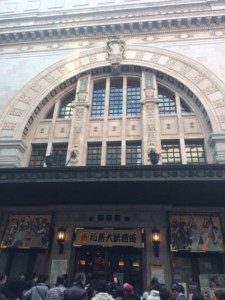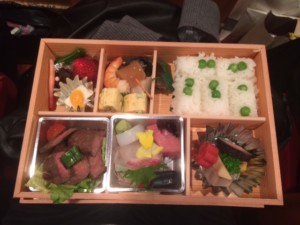Kabuki is a type of traditional Japanese theatre. It originated during the Edo period (1603~1868), when art and other entertainment started to gain their popularity among the people. Kabuki actors became extremely famous, just like modern day celebrities. There were ukiyoe posters with the actors’ faces printed on them, which advertised the upcoming plays. Today, Kabuki is still popular, and many of the actors also star in T.V. drama series, blockbuster films, and advertisements.
Kabuki theatre is made up by several plays. The style of each play differs from one another. For example, the first play may be a dance (mai or shosagoto) performed by a well-known actor. The next play would be a longer one, with script written in Old Japanese (jidaimono). These long plays are classics, and have been passed down and performed for generations. Also, there are plays with modern Japanese, and the actors often speak with a dialect. These plays called sewamono, are relatively easier to understand, as the stories are humorous and are about everyday life of ordinary people in the Edo period. On the other hand, mai and classics are usually based on myths.
Not only do the stories exemplify Japanese culture, but the beautiful kimonos that the actors wear are great for experiencing cuture. The kimonos are used as costumes, so they are not exactly what Japanese people used to wear. Also, the design and structure differs according to the character. For example, a villain would be wearing a kimono which colors and designs are exaggerated. The make-up also shows the character’s role in the play. Again, a villain would have strong red make-up to symbolize evilness.
One Kabuki theatre lasts a few hours long, of course with intermissions between each play. So, the audience would bring their own food to eat during the breaks. Most people buy bento at nearby stores. Bento or obento, are Japanese-style lunch boxes that have rice and cooked meals. Every aspect, from the food that you eat to the stories that you learn, is pure Japanese, so going to the Kabuki theatre will give you an educational, artistic, and cultural Japanese experience.



Get Social